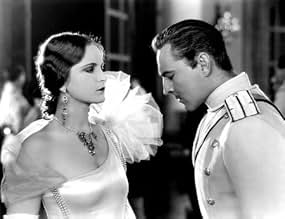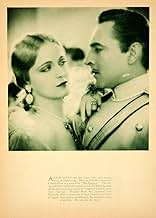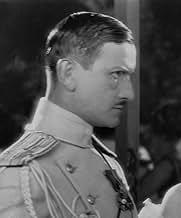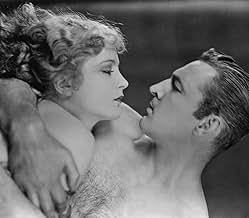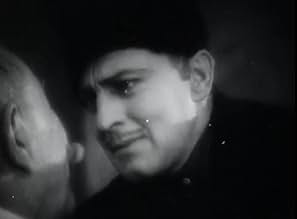In Czarist Russia, a peasant officer, resented by the aristocrats, falls in love with a princess.In Czarist Russia, a peasant officer, resented by the aristocrats, falls in love with a princess.In Czarist Russia, a peasant officer, resented by the aristocrats, falls in love with a princess.
- Won 1 Oscar
- 4 wins total
John Bleifer
- Soldier
- (uncredited)
Albert Conti
- Commission Board Member
- (uncredited)
Gregory Gaye
- Officer
- (uncredited)
Lena Malena
- Tamara's Friend
- (uncredited)
Michael Mark
- Soldier
- (uncredited)
Dick Sutherland
- Revolutionary Board Member
- (uncredited)
Wilhelm von Brincken
- Commission Board Member
- (uncredited)
6.7586
1
2
3
4
5
6
7
8
9
10
Featured reviews
Ignored Gem
I can't wrap my mind around the fact that Barrymore was in his forties when he made this film. He looks fit and fantastic, the true matinée idol. This is due in no small part to Rosher's astounding photography. This is a crazy, obsessional soap that may turn some people off, but John B. has some beautiful, moving moments that give me goosebumps. He was clearly still able to give his all at this point, and he does so here. His tearful scenes are believable and so well done. Camilla Horn was stunning and looked great with him, but she's so wooden that it dulls the effect a bit. Still, she had a long career in Germany, so I guess she couldn't have been so bad. Ivan is one big grey area when it comes to morality, and Barrymore conveys that very well.
I wish he could have pulled it together long enough to save his career and life from the self-parodying buffoonery that he sank into as he dissipated. He breaks my heart on many different levels.
I wish he could have pulled it together long enough to save his career and life from the self-parodying buffoonery that he sank into as he dissipated. He breaks my heart on many different levels.
He's Russian like there's no Tamara.
'Tempest' gives John Barrymore plenty of chances to show his left profile. The plot -- utmost tosh, about a peasant cavalry officer obsessed with Princess Tamara during the Russian revolution -- doesn't stand up to analysis. Suffice it to say that this is one of those movies where a man keeps harassing a woman until she falls in love with him.
As Tamara, the haughty White Russian princess, Camilla Horn makes a magnificent entrance on horseback, riding sidesaddle in a form-fitting outfit with gauntlet gloves. Barrymore acquits himself well with a ridiculous script. There's one painful scene in which Lieutenant Markov (Barrymore) sups large quantities of booze to show how manly he is. Knowing what alcohol did to Barrymore's life and career, I cringe when I see him drinking on the screen.
Among the ridiculous elements is Boris de Fast as a gap-toothed Bolshevik whose ability to be conveniently present during all the plot twists (even surreptitiously entering a military stockade) borders on the supernatural. Ullrich Haupt, as Barrymore's villainous superior officer, is splendidly hissable in a role that seems tailored for Erich von Stroheim. Character actor Michael Mark plays one of the cavalry troopers: no dialogue, no business, but his distinctive facial structure calls attention to itself. Louis Wolheim supplies a bit too much comic relief as the bulbous and bull-like Bulba: I guess he must be Taurus Bulba. Wolheim plays a cavalry sergeant, but his immense bulk makes him implausible in the role; Wolheim is built more like an infantryman.
By far, the greatest appeal of this movie is Charles Rosher's dazzling camera-work, supplemented by the usual brilliant production design of William Cameron Menzies. The opening scene is a travelling shot of a military garrison: the camera is clearly panning across models, but they're as exquisitely detailed as one of those miniature villages that used to be so popular in Britain. Eventually the camera turns round a corner to show men walking past full-scale buildings ... but the cut is so well done, it's nearly seamless. Elsewhere, there's a splendid subjective shot through the bottom of an upturned glass ... and a fine example of double-exposure as the delirious Barrymore, rotting in the stockade, envisions his comrades in battle.
I was also impressed with the consistent use of dissolves whenever printed words, handwriting or inscriptions were shown on screen. As all the characters are Russian, we first see signs and captions written in Cyrillic, followed by a dissolve into English translations. (Compare this with 'The Last Command', made at a different studio this same year, in which a Russian telegram is shown on screen in English.) Just a couple of times in 'Tempest' the dissolve device is not used, and there's one bizarre shot in which a handwritten note reading 'Do not disturb' in English is posted on the same door as a sign reading 'Commissar' in Cyrillic. Still, I'm vastly impressed that the art department went to so much trouble.
Although the script is rubbish -- and I'm dismayed that the Bolsheviks are depicted favourably -- Barrymore's role has an impressive amount of moral ambiguity. Lieutenant Markov is basically moral and ethical, but he becomes obsessed with Princess Tamara ... and his behaviour degenerates accordingly. The script (and Barrymore) could have taken an easier route by contriving to make all of Markov's reversals a matter of circumstances rather than down to Markov's personal flaws.
Despite a howlingly implausible script, the visuals and the acting are so good in this film that I'll rate it 7 in 10.
As Tamara, the haughty White Russian princess, Camilla Horn makes a magnificent entrance on horseback, riding sidesaddle in a form-fitting outfit with gauntlet gloves. Barrymore acquits himself well with a ridiculous script. There's one painful scene in which Lieutenant Markov (Barrymore) sups large quantities of booze to show how manly he is. Knowing what alcohol did to Barrymore's life and career, I cringe when I see him drinking on the screen.
Among the ridiculous elements is Boris de Fast as a gap-toothed Bolshevik whose ability to be conveniently present during all the plot twists (even surreptitiously entering a military stockade) borders on the supernatural. Ullrich Haupt, as Barrymore's villainous superior officer, is splendidly hissable in a role that seems tailored for Erich von Stroheim. Character actor Michael Mark plays one of the cavalry troopers: no dialogue, no business, but his distinctive facial structure calls attention to itself. Louis Wolheim supplies a bit too much comic relief as the bulbous and bull-like Bulba: I guess he must be Taurus Bulba. Wolheim plays a cavalry sergeant, but his immense bulk makes him implausible in the role; Wolheim is built more like an infantryman.
By far, the greatest appeal of this movie is Charles Rosher's dazzling camera-work, supplemented by the usual brilliant production design of William Cameron Menzies. The opening scene is a travelling shot of a military garrison: the camera is clearly panning across models, but they're as exquisitely detailed as one of those miniature villages that used to be so popular in Britain. Eventually the camera turns round a corner to show men walking past full-scale buildings ... but the cut is so well done, it's nearly seamless. Elsewhere, there's a splendid subjective shot through the bottom of an upturned glass ... and a fine example of double-exposure as the delirious Barrymore, rotting in the stockade, envisions his comrades in battle.
I was also impressed with the consistent use of dissolves whenever printed words, handwriting or inscriptions were shown on screen. As all the characters are Russian, we first see signs and captions written in Cyrillic, followed by a dissolve into English translations. (Compare this with 'The Last Command', made at a different studio this same year, in which a Russian telegram is shown on screen in English.) Just a couple of times in 'Tempest' the dissolve device is not used, and there's one bizarre shot in which a handwritten note reading 'Do not disturb' in English is posted on the same door as a sign reading 'Commissar' in Cyrillic. Still, I'm vastly impressed that the art department went to so much trouble.
Although the script is rubbish -- and I'm dismayed that the Bolsheviks are depicted favourably -- Barrymore's role has an impressive amount of moral ambiguity. Lieutenant Markov is basically moral and ethical, but he becomes obsessed with Princess Tamara ... and his behaviour degenerates accordingly. The script (and Barrymore) could have taken an easier route by contriving to make all of Markov's reversals a matter of circumstances rather than down to Markov's personal flaws.
Despite a howlingly implausible script, the visuals and the acting are so good in this film that I'll rate it 7 in 10.
Penultimate Barrymore Silent Is Good But Not Great.
TEMPEST was the penultimate silent movie made by John Barrymore (ETERNAL LOVE directed by Ernst Lubitsch would be the last). The setting is not Shakespeare but takes place around the time of the Russian Revolution. The direction is credited to Sam Taylor who was best known for his comedies but a lot of it was shot by Lewis Milestone and visually it shows in many of the scene compositions and camera angles.
The film is primarily remembered today for Charles Rosher's cinematography, the sets by William Cameron Menzies, and as the Hollywood debut of German actress Camilla Horn (Murnau's FAUST). While not a great movie, it does have a lot to offer especially for silent movie and/or John Barrymore fans.
This version from Kino is part of a 4 DVD set of silent films by John Barrymore although it can be purchased separately (BELOVED ROGUE, DR JEKYLL & MR HYDE, SHERLOCK HOLMES make up the rest of the set). The picture quality is good and although it says it's from 35mm, a lot of it looks like 16mm to me. This print is courtesy of the Killiam Collection and contains some pro-Soviet bits that were later removed.
The piano score is by William Perry. Back in 2003, Film Preservation Associates released their DVD version through Image Entertainment. It is clearly from 35mm although a little scratchier and offers two separate soundtracks (the original Vitaphone discs and a piano score by Philip Carli) as well as a one reel home movie of Barrymore on his yacht. That's the one to own although this release comes in a close second...For more reviews visit The Capsule Critic.
The film is primarily remembered today for Charles Rosher's cinematography, the sets by William Cameron Menzies, and as the Hollywood debut of German actress Camilla Horn (Murnau's FAUST). While not a great movie, it does have a lot to offer especially for silent movie and/or John Barrymore fans.
This version from Kino is part of a 4 DVD set of silent films by John Barrymore although it can be purchased separately (BELOVED ROGUE, DR JEKYLL & MR HYDE, SHERLOCK HOLMES make up the rest of the set). The picture quality is good and although it says it's from 35mm, a lot of it looks like 16mm to me. This print is courtesy of the Killiam Collection and contains some pro-Soviet bits that were later removed.
The piano score is by William Perry. Back in 2003, Film Preservation Associates released their DVD version through Image Entertainment. It is clearly from 35mm although a little scratchier and offers two separate soundtracks (the original Vitaphone discs and a piano score by Philip Carli) as well as a one reel home movie of Barrymore on his yacht. That's the one to own although this release comes in a close second...For more reviews visit The Capsule Critic.
John Barrymore Sees Red
Unfortunately, this is not John Barrymore starring in William Shakespeare's "The Tempest" - rather, "This is the storm-swept romance of a poor dragoon and a proud princess - of imperial Russia - in the last calm before the red tempest of terror. The year is 1914. The hour is midnight. The place is Volinsk - a garrison town near the Austrian border," as introduced in helpful title cards.
"'Tempest' was completed at the end of the silent era, and its release was delayed until it could be equipped with recorded musical accompaniment on Vitaphone discs. Seven of the discs have survived and are synchronized here; the gaps are filled by re-editing the available sound. A new digital stereo score performed by pianist Philip Carli is the primary soundtrack," according to the "Image Entertainment" DVD sleeve, "Our digital transfer is from a print made in the early 1950s from the camera negative."
Mr. Barrymore looks remarkable hale and hearty for an actor born in the early 1880s, showing off a still enviable physique in his shirtless scenes. He is often heavily made-up, and too obviously maneuvered into as many "Great Profile" photo opportunities as possible, but his performance as the upwardly mobile Russian peasant does not disappoint. Barrymore certainly delivers.
"Sam Taylor, who helmed some of Harold Lloyd's and Mary Pickford's most successful films, is the only credited director on 'Tempest'. However, in mid-production, Taylor replaced Russian-born Lewis Milestone, who in turn had taken over from Russian émigré director Victor Tourjansky," explains Image, "The original script by Erich von Stroheim was rewritten by Milestone and much modified by C. Gardner Sullivan, a reliable craftsman who received sole screen credit. Some original aspirations for authenticity survive in the contributions of several actual White Russian officers working as small-part players and technical advisers."
The film greatest strength is the outstanding work by the United Artists assembled technical crew. Titles by George Marion Jr., art direction by William Cameron Menzies, and photography by Charles Rosher were all praised at Hollywood's first annual "Academy Awards" banquet. Marion was mentioned for his work on Colleen Moore's "Oh Kay!" Mr. Menzies won for "Tempest and "The Dove". And, Mr. Rosher was mentioned for the winning "Sunrise", Ms. Pickford's "My Best Girl" and "Tempest".
Pretty princess Camilla Horn, who impressed in F.W. Murnau's "Faust" (1926), looks like she was producer (and then lover) Joseph M. Schenck's choice to take the Greta Garbo route to super-stardom. It doesn't work, herein, but neither is Ms. Horn a deterrent. Louis Wolheim and George Fawcett are marvelous as always. The Russian-born Boris de Fast makes an excellent impression as the gap-toothed socialist peddler. If the "Oscar" category for "Supporting Actor" had existed, Mr. Wolheim might have been noted, for some combination of acting effort; he appeared in no less than four films nominated during the eligibility year.
******* Tempest (5/17/28) Sam Taylor ~ John Barrymore, Camilla Horn, Louis Wolheim, Boris de Fast
"'Tempest' was completed at the end of the silent era, and its release was delayed until it could be equipped with recorded musical accompaniment on Vitaphone discs. Seven of the discs have survived and are synchronized here; the gaps are filled by re-editing the available sound. A new digital stereo score performed by pianist Philip Carli is the primary soundtrack," according to the "Image Entertainment" DVD sleeve, "Our digital transfer is from a print made in the early 1950s from the camera negative."
Mr. Barrymore looks remarkable hale and hearty for an actor born in the early 1880s, showing off a still enviable physique in his shirtless scenes. He is often heavily made-up, and too obviously maneuvered into as many "Great Profile" photo opportunities as possible, but his performance as the upwardly mobile Russian peasant does not disappoint. Barrymore certainly delivers.
"Sam Taylor, who helmed some of Harold Lloyd's and Mary Pickford's most successful films, is the only credited director on 'Tempest'. However, in mid-production, Taylor replaced Russian-born Lewis Milestone, who in turn had taken over from Russian émigré director Victor Tourjansky," explains Image, "The original script by Erich von Stroheim was rewritten by Milestone and much modified by C. Gardner Sullivan, a reliable craftsman who received sole screen credit. Some original aspirations for authenticity survive in the contributions of several actual White Russian officers working as small-part players and technical advisers."
The film greatest strength is the outstanding work by the United Artists assembled technical crew. Titles by George Marion Jr., art direction by William Cameron Menzies, and photography by Charles Rosher were all praised at Hollywood's first annual "Academy Awards" banquet. Marion was mentioned for his work on Colleen Moore's "Oh Kay!" Mr. Menzies won for "Tempest and "The Dove". And, Mr. Rosher was mentioned for the winning "Sunrise", Ms. Pickford's "My Best Girl" and "Tempest".
Pretty princess Camilla Horn, who impressed in F.W. Murnau's "Faust" (1926), looks like she was producer (and then lover) Joseph M. Schenck's choice to take the Greta Garbo route to super-stardom. It doesn't work, herein, but neither is Ms. Horn a deterrent. Louis Wolheim and George Fawcett are marvelous as always. The Russian-born Boris de Fast makes an excellent impression as the gap-toothed socialist peddler. If the "Oscar" category for "Supporting Actor" had existed, Mr. Wolheim might have been noted, for some combination of acting effort; he appeared in no less than four films nominated during the eligibility year.
******* Tempest (5/17/28) Sam Taylor ~ John Barrymore, Camilla Horn, Louis Wolheim, Boris de Fast
Facial Expressions Are Key!
Drama
Format: Standard 4:3, B&W, silent
Director: Sam Taylor
Starring: John Barrymore and Camilla Horn
Drew Barrymore's grandfather John is the main highlight of this film. His portrayal of Ivan Markov during 1914 Czarist Russia is ripe with excellent acting and great emotion, which flows forth from his face. Some supporting actors in this film were not too great, except for George Fawcett, who plays the commanding General of Ivan's garrison. The main problem with the characters and acting is too much fluff and too much over acting, but Barrymore is amazing.
In one scene, he is being demoted and sent to jail and the anguish coming off of his face, as they tear his medals off of his vest, is something to be seen. In another scene we see Ivan enter into madness and just the look on his face is something I won't forget for a while. While he is in prison, he begins to see images on the prison wall, which is done quite well with very good matte work for 1928.
Fawcett's character is very likeable and you enjoy seeing him every time he comes into a scene. His kindness he shows towards Ivan, from behind a rough exterior, is very believable and heart-warming. I also enjoyed Louis Wolheim as Bulba, but 3/4 of the way through the film his character changes and I didn't like that.
The story is quite good, and I worry that some of it may have been lost due to missing splices that looked like chunks of lost continuity. Right in the very beginning and especially at the very end. An excellent shot of the town opens up to a really nice story that falls apart slightly by the end, but definitely a film worth seeing. It is not great, but is very good.
8.2 (B MyGrade) = 8 IMDB.
Drew Barrymore's grandfather John is the main highlight of this film. His portrayal of Ivan Markov during 1914 Czarist Russia is ripe with excellent acting and great emotion, which flows forth from his face. Some supporting actors in this film were not too great, except for George Fawcett, who plays the commanding General of Ivan's garrison. The main problem with the characters and acting is too much fluff and too much over acting, but Barrymore is amazing.
In one scene, he is being demoted and sent to jail and the anguish coming off of his face, as they tear his medals off of his vest, is something to be seen. In another scene we see Ivan enter into madness and just the look on his face is something I won't forget for a while. While he is in prison, he begins to see images on the prison wall, which is done quite well with very good matte work for 1928.
Fawcett's character is very likeable and you enjoy seeing him every time he comes into a scene. His kindness he shows towards Ivan, from behind a rough exterior, is very believable and heart-warming. I also enjoyed Louis Wolheim as Bulba, but 3/4 of the way through the film his character changes and I didn't like that.
The story is quite good, and I worry that some of it may have been lost due to missing splices that looked like chunks of lost continuity. Right in the very beginning and especially at the very end. An excellent shot of the town opens up to a really nice story that falls apart slightly by the end, but definitely a film worth seeing. It is not great, but is very good.
8.2 (B MyGrade) = 8 IMDB.
Did you know
- TriviaCarole Lombard was considered for the role of Princess Tamara.
Details
Contribute to this page
Suggest an edit or add missing content



